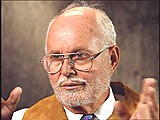You searched for: jewish
<< Previous | Displaying results 2431-2440 of 2502 for "jewish" | Next >>
-
Aron (Dereczynski) Derman describes deportations from the Grodno ghetto in November 1942
Oral HistoryAron was born to a middle-class Jewish family in Slonim, a part of Poland between the two world wars. His parents owned a clothing store. After studying in a technical school, Aron worked as a motion-picture projectionist in a small town near Slonim. The Soviet army took over Slonim in September 1939. War broke out between Germany and the Soviet Union in June 1941. Aron returned to Slonim. The Germans soon occupied Slonim, and later forced the Jews into a ghetto. Aron was forced to work in an armaments…
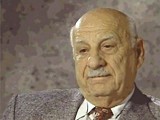
-
Felix Horn describes attempt to flee from the Majdan Tatarski ghetto
Oral HistoryFelix was born to an assimilated Jewish family in Lublin, Poland. His father was a locksmith and his mother was a singer. Following the German invasion of Poland on September 1, 1939, Felix fled east to Rovno and then to Soviet-occupied Lvov, where he was accepted at a medical school. After the German invasion of the Soviet Union in June 1941, Felix was taken to a labor camp. He escaped and returned to Lublin, and found that his family had been forced into the ghetto established there. After the…
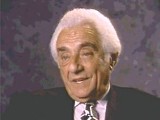
-
Wilek (William) Loew describes the hiding place in which his mother survived an Aktion in Lvov
Oral HistoryWilek was the son of Jewish parents living in the southeastern Polish town of Lvov. His family owned and operated a winery that had been in family hands since 1870. Wilek's father died of a heart attack in 1929. Wilek entered secondary school in 1939. Soon after he began school, World War II began with the German invasion of Poland. Lvov was in the part of eastern Poland annexed by the Soviet Union. Although the Soviets took over Wilek's home and the family business, Wilek was able to continue his…
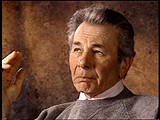
-
Israel Ipson describes forced labor to construct an airplane runway
Oral HistoryIsrael was raised in Kovno, Lithuania, and graduated from law school there in 1933. Because of anti-Jewish discrimination, he was unable to practice law. The Germans invaded the Soviet Union in June 1941, occupying Lithuania. The Kovno ghetto was established that August. By claiming to be a mechanic, Israel escaped several massacres. He was forced to work on a wooden airport runway outside the ghetto. After he escaped, Israel, his wife, and son hid in a potato pit for 9 months until liberation by Soviet…
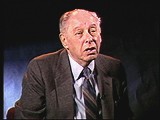
-
Barbara Ledermann Rodbell describes receiving her first set of false papers
Oral HistoryIn 1933 Barbara's family moved to Amsterdam, in the Netherlands. They became friends of Anne Frank and her family. The Germans invaded the Netherlands in 1940. Barbara's boyfriend, Manfred, had underground contacts and she got false papers. Her mother, sister, and father were deported to Westerbork and then to Auschwitz. Barbara survived using her false papers and worked for the resistance. She helped take Jews to hiding places and also hid Jews in an apartment held in her false name.
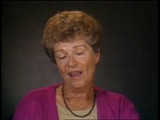
-
Tina Strobos describes her courier duties for the underground in the Netherlands
Oral HistoryTina was a medical student when the Germans invaded the Netherlands in May 1940. She and members of her sorority joined the underground, and she hid Jews in her house from the beginning of the war. Tina found hiding places for Jewish children, forged passports, and served as a courier for the underground.
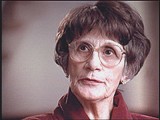
-
Cecilie Klein-Pollack describes arrival at Auschwitz
Oral HistoryCecilie was the youngest of six children born to a religious, middle-class Jewish family. In 1939, Hungary occupied Cecilie's area of Czechoslovakia. Members of her family were imprisoned. The Germans occupied Hungary in 1944. Cecilie and her family had to move into a ghetto in Huszt and were later deported to Auschwitz. Cecilie and her sister were chosen for forced labor; the rest of her family was gassed upon arrival. Cecilie was transferred to several other camps, where she labored in factories. Allied…
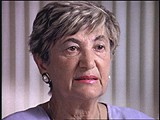
-
Henny Fletcher Aronsen describes the importance she attached to the role of cleanliness in surviving forced labor at Stutthof
Oral HistoryHenny was born into an upper-middle-class Jewish family in Kovno, Lithuania. She and her brother attended private schools. In June 1940 the Soviets occupied Lithuania, but little seemed to change until the German invasion in June 1941. The Germans sealed off a ghetto in Kovno in August 1941. Henny and her family were forced to move into the ghetto. Henny married in the ghetto in November 1943; her dowry was a pound of sugar. She survived several roundups during which some of her friends and family were…
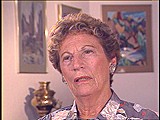
-
Walter Meyer describes activities of members of the Edelweiss Pirates in Duesseldorf, Germany
Oral HistoryWalter was born in Kassel, north central Germany, but grew up in the Rhineland. As a youth, Walter questioned the German superiority and antisemitism he was taught. His father, an anti-Nazi, refused to allow Walter to enter one of the Adolf Hitler Schools, but did permit him to join the Hitler Youth. However, Walter's rebellious streak led him to hide a Jewish friend in his basement. He also formed a gang that played pranks on young Nazis and helped French prisoners of war. They called themselves Edelweiss…
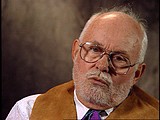
-
Walter Meyer describes his 1943 trial for looting, and the impact of his role in the Edelweiss Pirates on the sentence he received
Oral HistoryWalter was born in Kassel, north central Germany, but grew up in the Rhineland. As a youth, Walter questioned the German superiority and antisemitism he was taught. His father, an anti-Nazi, refused to allow Walter to enter one of the Adolf Hitler Schools, but did permit him to join the Hitler Youth. However, Walter's rebellious streak led him to hide a Jewish friend in his basement. He also formed a gang that played pranks on young Nazis and helped French prisoners of war. They called themselves Edelweiss…
